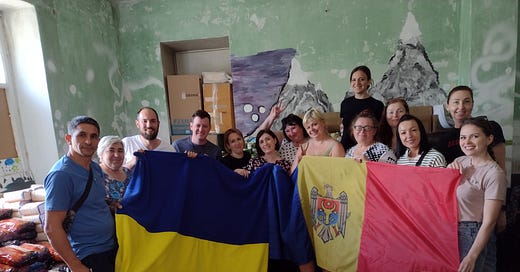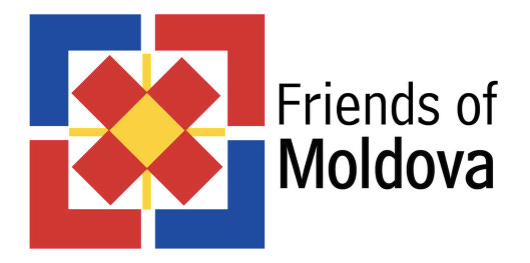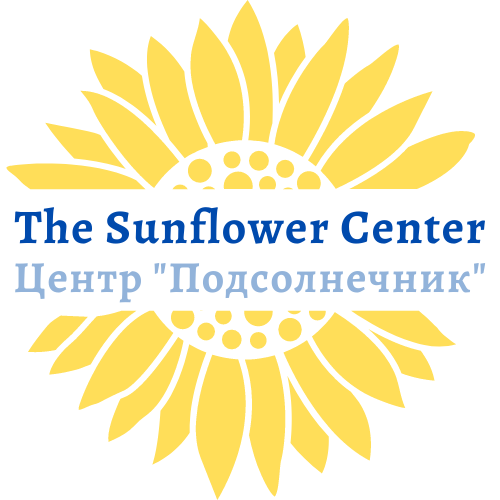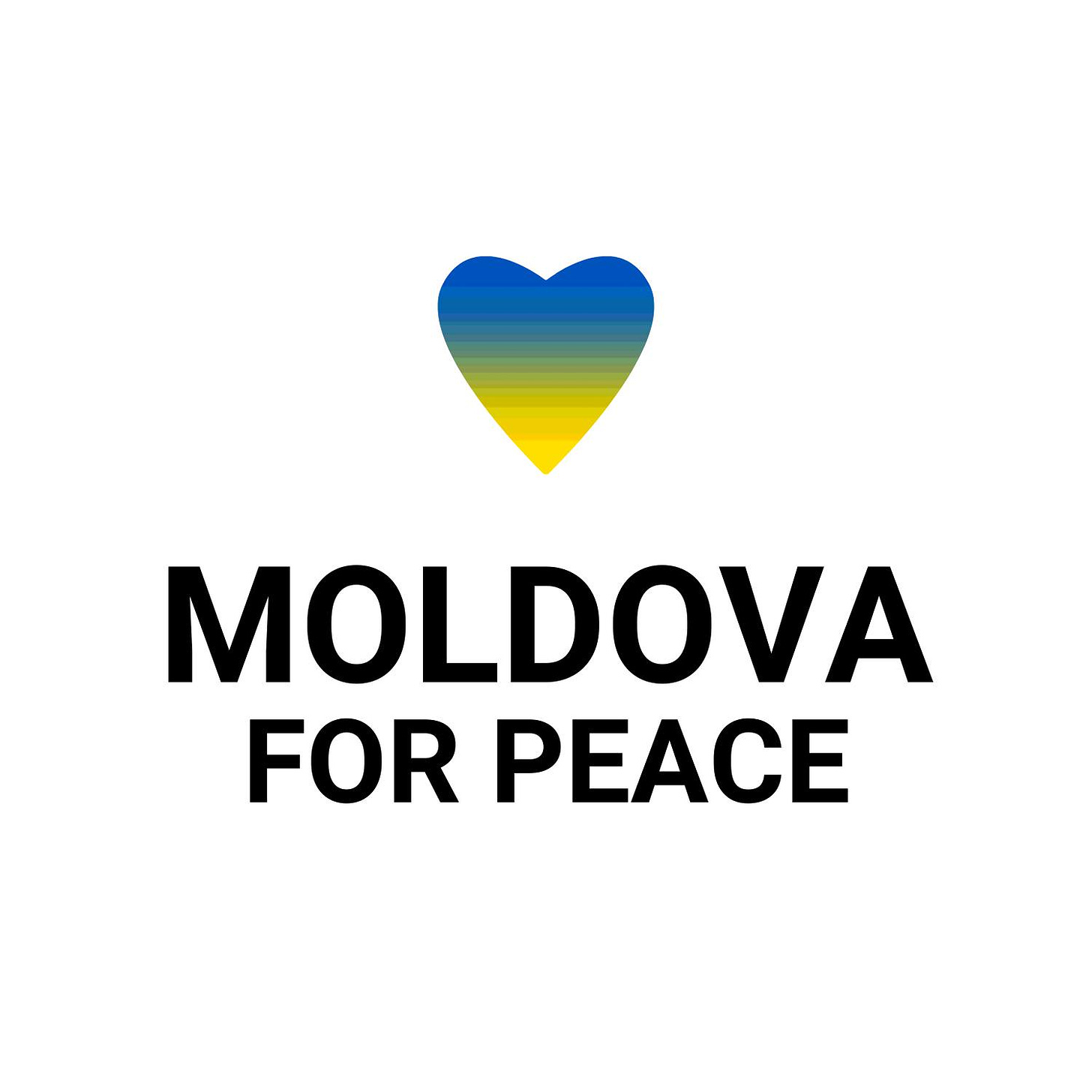Welcome back to “Deep Dives” at Moldova Matters! This week we are going to take a look at the situation with Ukrainian refugees in Moldova now, and how it has evolved over the last 6 months.
Information about Ukrainians fleeing the war and becoming refugees in neighboring countries has largely fallen out of the news in past months - both in Moldova and around Europe. In part, this is because a major shift occurred in May and June as larger international NGOs as well as government efforts ramped up. At the same time, Ukrainian battlefield successes made it clear that Russian tanks would not be rolling to the Moldovan or Polish borders imminently. The crisis shifted from an acute “all hands on deck” emergency to something more of a medium and long term challenge. No longer were there huge lines of people and cars at the border, or were organizations scrambling to bring desperately needed humanitarian supplies to overcrowded refugee centers. At the same time, massive challenges remained and huge numbers of volunteers have continued to work month after month to support refugees. We’re going to look at the evolution of this crisis and how things stand now as the cold weather is setting in.
Author’s Note: In Spring 2022 I was involved with supporting refugees 6 days a week with Friends of Moldova, AIM, Peace Corps Moldova, and my restaurant Smokehouse. Since then my involvement diminished as medium and large scale international groups came in to provide support and to partner with grassroots efforts on the ground. This article was compiled from interviews conducted over September and October with people who are still involved in supporting refugees day to day. The contents of this article are my own interpretation of those interviews and the broader narrative they tell. Unless specifically noted, none of these thoughts is directly attributable to an individual or organization as some people wanted anonymity in order to speak candidly.
Late Spring - Early Fall: Major Changes
As May passed to June the initial refugee crisis in Moldova began to abate. Major efforts by the UNHCR to distribute pre-paid cash cards to refugees, and Moldovan families who were hosting refugees, were finally underway in parallel with an effort by Catholic Relief Services (CRS) to distribute prepaid supermarket and pharmacy vouchers for food and personal hygiene items. These efforts were a light at the end of the tunnel for many grassroots efforts where local and small dollar fundraising was starting to give out. At the same time, there were major problems. On May 18th, Speaker of Parliament Grosu noted his dissatisfaction with the continued slow work of the UN agencies. He said he conveyed his disappointment directly to the UN Secretary General and publicly stated:
"I am not satisfied with the way the UN refugee department is currently handling this process. The latest data show that only over 30,000 refugee families have benefited from the money. Even smaller is the number of Moldovan families that host Ukrainian citizens,"
I spoke with Francesca Bonelli, Representative of the UNHCR in Moldova in late September. She explained that the rollout of cash assistance cards eventually reached 86,000 cards in the first distribution and that they were currently on the 5th monthly distribution cycle. However she noted that the number of people applying for and getting assistance declined over time.
By June, the total number of refugees in Moldova had declined from a spring peak near 100,000 down to 43,000 on June 6th. Much of this decline was because of efforts by government actors, and international NGOs such as Be An Angel who worked to arrange busses and trains directly from border crossings onwards to accommodations in Romania and Germany. These efforts took some pressure off of the Moldovan families who were still hosting more than 50% of all refugees in Moldova.
This downward trend did not hold however, and by October 12th the total number of refugees in Moldova was back up to 83,000. The numbers have held stead between 80,000 and 90,000 since then.
The Picture from the Grassroots
Many grassroots groups that began their activities in the first days of the war have continued to play a major role in the response right through today. For this article I spoke with the team at the Friends of Moldova distribution center in Balti, the Sunflower Center in Chisinau, Refugee Support UK’s Dignity Shop in Chisinau, the Moldova for Peace distribution warehouse in Chisinau, and others. Together they painted a picture of an evolving situation with new challenges, new donors and supporters, and worries about winter ahead.
Links to support / donate to these groups are below
The Friends of Moldova team in Balti
Financial Lifelines - Medium Sized NGOs to the Rescue
Most grassroots efforts I talked to said that their small dollar pipeline of donations mostly dried up in the late Spring. Donations are still coming in but not nearly in proportion to the need they face on the ground. Few groups got any direct support from the UNHCR or the other institutional donors with many activists bitterly wondering what (if anything) the UN organizations were doing outside of publicity. At the same time, a group of organizations that I will loosely define as “medium sized” stepped in (“medium” aka international, well funded, but no where near the size of the UN, Red Cross or other institutional organizations). Groups like Be An Angel, Church World Services, Lifting Hands International and many others have stepped up in a big way.
The basic structure for many of these efforts has been a medium sized NGO coming in, finding established and successful grassroots efforts and supporting them financially. This has filled the gap made by the reduction in small dollar donations and allowed planning on a quarterly or even 6+ month long basis possible.
At the same time there are challenges. Even with relatively nimble international NGOs grant funding can be restrictive. Some activists complained that while it was possible to get steady funding for food and personal hygiene products, it was very hard to find consistent funding to pay the staff. At this point many of the people working day in and day out to distribute aid are themselves Ukrainian refugees. At times, months go by where there are no donors who allow money to be spent to pay people working full time to actually move the pallets of food around and distribute it.
Universally I was told that even if there is a month with no pay, people keep coming to help.
Additional challenges come from unexpected expenditures. Money may be budgeted for aid, but what happens if the distribution center roof leaks and needs to be repaired? All grassroots groups I talked to continue to rely on dwindling small dollar donations to bridge these gaps.
Finally, while the support and network effects of these medium sized NGOs has been incredible they also face challenges. Last month I visited the Moldova for Peace warehouse that continues to distribute between 200 and 300 food and hygiene packs a day. Each pack supports a family for 10 days at which time they are able to register in their online system for another pack. But when I was at the warehouse, they were completely out of food. They had run out the day before and were waiting for support from a donor to come through. The Moldova for Peace team was super thankful for the donors that were providing the grants, but they noted that gaps happen. They still had personal hygiene and baby food from UNICEF so work went on and they asked refugees to wait until more food could be bought.
The Changing Face of Support
So far, most of this talk has been about food, personal hygiene items and clothing. These efforts are ongoing, and even with UNHCR’s cash distribution efforts, they play a major role in bridging the financial gap for many families. At the same time, Friends of Moldova, the Sunflower Center and Moldova for Peace, have all expanded their work to include other types of support. All 3 groups are involved in the following activities to various extents:
Psychological Support and Counseling - Everyone who has fled their home in this war has experienced trauma. This is especially true with children who make up 50% of all the refugees in Moldova. Many grassroots NGOs are providing counseling, both group and one on one, for refugees. The UNHCR has worked to call attention to this crisis with a moving video you can find here (youtube link).
Medical Consultations - Many centers ask either local doctors, or Ukrainians who are doctors, to hold simple consultations. Any complicated procedures or prescriptions must go through Moldovan medical institutions (which are free for Ukrainians) but having a doctor available for questions basic support has been important.
Children’s Activities - The Sunflower Center, as well as the new Moldova for Peace community center, have focused a lot of energy on providing children’s activities. This was especially true in summer when school was not in session but remains important today. Not only does this provide activities for kids, it give parents some free time to shop, do group activities, or go to counseling themselves.
Activity Space for Online School - Of the 20,000 refugee children on school age, only around 2,000 are attending Moldovan schools this fall. The reasons are complicated. In some cases, parents didn’t want to send their kids to Romanian speaking schools (though Moldova also has Russian speaking schools). In other cases, there have been rumors (which are false) that attending school in Moldova will result in being held back a year in Ukraine. Others simply don’t want to put down roots and hope to return to Ukraine soon. Whatever the reason, most Ukrainian children in Moldova are attending online school with their teachers in Ukraine. Many NGOs and community centers have stepped up to provide space and support for this process.
All of these examples highlight the changing nature of the crisis from an acute emergency phase to something longer term that looks beyond food and necessities. Both grassroots NGOs and medium and large donors have adapted to this reality and are working to meet the needs as they exist today.
The Changing Faces of Refugees
Complicating the work of all these groups is the fact that the people who find themselves refugees in Moldova are not the same as the group that was here in Spring. When the war started, the first wave was people with cars and money. The second wave was people on foot carrying what they could in their backpacks and roller bags. Now, this picture is jumbled as shifts in the fighting and economic situation in Ukraine drive difficult, personal choices to leave - or to return. Here are some patterns that came up in my conversations.
Lots of new faces - Everyone agreed that they see lots and lots of people coming into their centers for the first time. In some cases it is refugees who have been in Moldova for months but only recently found where to get help. In other cases, their personal resources ran out and only now do they need help. In lots of cases, people recently left Ukraine. There was no single answer for why people left now when they didn’t leave in the spring. Some refugees mentioned costs and energy prices (or power outages). Others told volunteers that it was only when a bomb fell on their neighbor’s house that the war really came home to their village and they decided to leave.
People go back and forth - Over the summer NGOs started to notice that many refugees would go back to Ukraine periodically for visits. Many people would go and meet their husbands, brothers, fathers and grandfathers at relatively safe places near the border. In most cases volunteers noted that people who leave and come back are happy to see their loved ones, but get re-traumatized by the experience of going back and forth to a war zone.
Lots of dual citizens - All groups noted a sudden uptick of dual Moldovan-Ukrainian (or Ukrainian-Transnistrian) citizens over the summer. NGO leaders believe that the worsening economic situation in Moldova has resulted in dual citizens getting out the Ukrainian passports and looking for help. Most NGOs have begun to restrict aid to people who can show a passport stamp proving the entered Moldova after the war started. No one I talked to really knew how to deal with the moral ambiguity of turning away people in need on technicalities, but all said that they needed to make hard choices given scarce resources.
Organized aid runs - Another morally ambiguous situation has been organized vans coming from Ukraine for aid. In some cases 5-10 people will drive over in a van after which they go around to various aid centers loading up food and essentials to bring back to Ukraine. The economic situation in Ukraine is dire and international aid delivered to Ukraine is not uniform across the country. NGOs have also begun to watch for this activity and take steps to make sure that resources are directed at people who are living in Moldova. Once again, volunteers and NGO leaders are grappling with cases of real need and the reality of severely limited resources.
Shifting short and long term mentalities - Everyone I talked to said that most refugees they talk to are still grappling with the idea that this might be a long term reality for them. This is evident in the online schooling situation as well as lots of day to day choices people are making - people want to go home. Ukraine has asked that no refugees return until Spring because the energy and electrical grid can’t support them. This reality is proving challenging for people to accept.
What is the UNHCR Focusing on?
Last month I spoke to Francesca Bonelli, Representative of the UNHCR in Moldova about the work they are doing and how she sees the evolution of the refugee situation in the coming months.
In our conversation, she echoed many of the impressions of grassroots organizations in terms of the shifting challenges and roles of aid organizations. We spoke on September 29th, and on that day the UNHCR had recorded around 90,000 Ukrainian refugees in Moldova but noted that the situation was fluid. On the day before 1,500 Ukrainians had entered Moldova while 1,400 had left back to Ukraine. In part there is the in / out flow of people going to see family in Ukraine on weekends. But in addition to that, some Ukrainians come too Moldova to shop for fresh fruits and vegetables that are less available in Ukraine. Representative Bonelli noted that this is especially true in the north of Moldova and believes that part of the reason is that Western Ukraine is less supported by international aid organization because it is farther from the war. People there are less likely to flee the fighting, but somewhat more likely to come to Moldova, even just short term, for economic reasons.
We discussed what the UNHCR is focused on right now and she outlined the following primary work areas:
Cash Assistance - At the time of our conversation, the UNHCR was on the 5th month of cash distributions to refugees. This is planned to continue through winter.
Winterization - The UNHCR is working with 27 organization in Moldova on winterization plans. This includes cash support, firewood supplies, and coordinating safe heated spaces with hot food.
Keeping the Refugee Accommodation Centers (RACs) Ready - Most RACs shut down in late spring as the first waves ended (MoldExpo Center, stadiums, tent camps, etc). The UNHCR is keeping prepared to reactivate them in the event of another mass wave. They are also preparing to open up RACs for Moldovans as well if the energy crisis leaves people with no where warm to go this winter.
Community Support - The UNHCR partnered with Moldova for Peace in setting up a community center in Chisinau. It provides the services outlined above (psychological support, children’s programming, area for online school, etc)
This list is not exhaustive but identifies key focus areas. The UNHCR collaborates with the government as well as other large scale NGOs in a number of areas that change over time.
One thing the UNHCR is not doing is coordinating with grassroots NGOs or local responders around the country. Representative Bonelli was clear that the most of the picture they have about where refugees are is very high level - border crossing information. The government has not created a more clear picture than that. She sees the UNHCR’s role as working where possible with grassroots groups, but noted that there had been very little collaboration to date. Based on conversations noted above with such NGOs, it seems both sides are fairly unaware of what the other is doing and little effort is being made at a high level to coordinate support.
Speaking about resources, Representative Bonelli said that the UNHCR’s donors (mostly governments) have indicated an open ended commitment and that their funding and programming is currently planned well into next year. With that said, she noted that it will be hard to maintain the level of funding that was present this year and suggested that things are likely to be more challenging in 2023.
Asked about the potential for a new wave of refugees this winter, Representative Bonelli said that they have no hard numbers or projections about what this might look like. She said that the UN agencies are all very worried about the cost of living situation both in Ukraine and in Moldova and that they expect economically driven refugees - but don’t know how many or when. I reached out to the Ministry of Labor and Social Protection and got a similar response. Everyone knows another wave is possible, but events are impossible to predict now. The UNHCR and all other groups I spoke with are simply preparing and waiting to see how things develop.
In closing our conversation, Representative Bonelli stressed that this is a marathon not a sprint and that UNHCR, grassroots organizations, and other international donors all want the same thing. She stressed the importance of working together in order to provide the most support possible given challenging situations.
Looking Ahead to Winter
On November 6th Moldova’s Minister of Internal Affairs said that they believe another major wave of refugees is a possibility this winter. All NGOs and volunteers I spoke with felt that the onset of the cold season is likely to displace more people who cannot afford energy prices or food in Ukraine.
Most of these conversations happened before Russia began its campaign of long range missile and drone strikes against Ukrainian electrical infrastructure. In the weeks since this new campaign began, Ukraine’s energy grid has been bought to the brink of disaster. This week, Kyiv’s Mayor stated that it is possible that the city will completely lose electricity which will also cripple the water and sewage systems. He is asking Kyiv’s 3 million residents to prepare to evacuate if this happens and find places to stay with relatives outside the city. Situations like this across Ukraine are guaranteed to drive a major new wave of refugees if they come to pass.
Everyone I spoke with was exhausted from the last 8 months. People have worked beyond what they though their capacity was and then worked some more. The fact that winter may bring energy disruptions in Ukraine (and Moldova) as well as another wave of refugees was very much on everyone’s mind. Overall, though tired, each group I spoke with was determined to cope with whatever came next.
How You Can Help
There are many great organizations working to support refugees from this war. These 4 groups are among the best grassroots responders in Moldova. Their teams have been active since the first days of the war and donations go straight to the support efforts on the ground.
Friends of Moldova
Friends of Moldova is a US registered 501c3 created by former Peace Corps Volunteers to support projects in Moldova. When the war started they initially acted as a funding channel to the efforts located at Smokehouse (my restaurant) but have since opened up a similarly organized distribution center in the north of Moldova in the city of Balti. From this center, they provide food, personal hygiene items, and other services (medical consultations, psychological support and more) to refugees who come to their center. In addition to supporting hundreds of people a week (the line was 50 persons long when I was there) they support 5-6 other refugee centers in the north of Moldova with weekly deliveries including local government office. In total, Friends of Moldova has “distributed over $816,000 in direct support to over 65,000 Ukrainian refugees.”
The Sunflower Center
The Sunflower Center was created this spring to support Ukrainian mothers and children who find themselves refugees in Moldova. They have games and activities such as music classes, art and crafts for kids, as well as psychological counseling for both children and mothers. The staff running and managing the center are themselves Ukrainian refugees. So even salary payments go right to beneficiaries. The center is a warm, welcoming place for kids and mothers going through a very difficult time.
Donation Link - Processed by Friends of Moldova. 100% of Donations go to the Sunflower Center
Refugee Support UK
Refugee Support is a charity registered in England and Wales that brought their tested model of “Dignity Shop” to Moldova in the first months of the war. Refugee families register through Moldova for Peace’s Dopomoha online platform where they are given a ticket time to come and pickup supplies. Once they get to the Dignity Shop they are met by volunteers and given a sort of “monopoly money” that they can shop with. Refugee Support built this model so that people can feel the dignity of buying what their family needs instead of getting a one size fits all handout bag. The center is 100% staffed with international volunteers who come for a few weeks at a time - if you’re interested they have signup information on their website. Currently the center supports around 700 people a week.
Moldova for Peace
In the first days of the war Moldova for Peace emerged as the most effective group of grassroots volunteers and coordinators bridging the gap between government agencies and needs on the ground. Today, the group continues primarily to support refugees through their Dopomoha online platform where refugees can request a 10 day food and personal hygiene aid package. From Moldova for Peace’s warehouse in Chisinau these packages are compiled by volunteers and distributed at a rate of around 200 - 300 a day. October was a hard month for the organization facing funding gaps and supply chain problems around fresh produce. Today the warehouse is running at 100% capacity. Moldova for Peace runs to Dopomoha online scheduling platform that coordinates between multiple aid centers. They also have opened a community center in partnership with UNHCR.
And consider becoming a paid subscriber to support our work at Moldova matters. For just $5 / month, the price of a nice coffee, you can support this work and help us expand into even better content!









Hi David - thank you very much for recognising Refugee Support in this edition; and for your always insightful newsletters which we always make a point of reading carefully
Thanks for this thorough and timely review of the refugee situation, David. Very helpful!